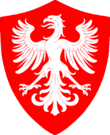National Conservative Party (Seketan)
This article is incomplete because it is pending further input from participants, or it is a work-in-progress by one author. Please comment on this article's talk page to share your input, comments and questions. Note: To contribute to this article, you may need to seek help from the author(s) of this page. |
National Conservative Party Consyvaþeça Nasijoteça ynden | |
|---|---|
| Abbreviation | CNy |
| Leader | Cjetor Tamš |
| President | Lyeslji Yorgan |
| Founded | March 2, 1983 |
| Split from | Kjedorate Party |
| Youth wing | Young CNys |
| Ideology | Economic Liberalism Liberal Conservatism |
| Political position | Centre-Right |
| Colors | Blue |
| Commons Council | 27 / 293
|
| State Council | 10 / 106
|
| State Governors | 1 / 7
|
| State Legislatures | 64 / 487
|
 |
|---|
| This article is part of a series on the politics and government of Seketan |
The National Conservative Party (Seketese: Consyvaþeça Nasijoteça ynden), also known as the Conservative Nationals[1] (Seketese: Consyvaþeça Nasijotena) or CNy, is a conservative political party in Seketan. The party was founded in 1983 after several MHs of the Kjedorate Party left their caucus. Today, the party sits on the centre-right to right-wing of the Seketese political spectrum. The party's current leader is Cjetor Tamš, who has been the leader since 2022.
Since its creation, the party has been the main conservative party in Seketan, being the largest opposition in parliament for most of its history. From 1996 to 1999 and 2005 to 2014 the party was in government.
Today the party is the third largest party in the Commons Council, and second largest in the State Council of the Hérvynsken and the governing party in 1 state, Giorgi-Alesk. They are currently the largest opposition party in 3 other states.
History
Historically, Seketan's right-wing was dominated by the authoritarian Kjedorate Party. During their authoritarian rule, partisan activity was severly resticted, thus limiting the practical application of "right-wing/left-wing" politics. With the conclusion of the 1978 Seketese Revolution and the start of the democracy in Seketan, the Kjedorates were allowed to participate in the first elections. Lead by Þorn Manneir, the Kjedorates campaigned on economic liberalism and anti-communism in an effort to distance themselves from their unpopular authoritarian past. Winning 42 seats and 25% of the vote, the party became to main opposition party to the new grand coalition government.
Over the next couple elections, the party increasingly lost votes to the more moderate Liberals and Democrats, and the right-wing UNA. In 1983, Tim Hoerson was chosen to be the parties Prime Ministerial candidate on an explicitly pro-authoritarian and revisionist platform, leading 9 moderate members of the party to publiclly split to form the New Conservative Caucus on January 12 1983 as a temporary arrangement. A few months later on March 2 the group formally organized themselves as the National Conservative Party, with an explicitly pro-democratic allignment.
Election Results
| Election | Party votes | Total % | Change % | Seats won | Seats change | Status |
|---|---|---|---|---|---|---|
| 1984 | 441,487 | 16.5% | New | 16 / 193
|
New | Opposition |
| 1988 | 609,498 | 20.3% | 37 / 193
|
Opposition | ||
| 1992 | 693,686 | 29.7% | 45 / 193
|
Opposition | ||
| 1996 | 1,068,647 | 37.4% | 86 / 193
|
Coalition (with DY and ELY) | ||
| 1999 | 1,026,137 | 32.5% | 35 / 193
|
Opposition | ||
| 2003 | 824,369 | 27.6% | 59 / 193
|
Opposition | ||
| 2005 | 1,039,188 | 35.9% | 126 / 293
|
Minority | ||
| 2006 | 1,229,369 | 40.5% | 162 / 293
|
Majority Government | ||
| 2010 | 1,056,438 | 36.3% | 149 / 293
|
Majority Government | ||
| 2014 | 735,843 | 22.9% | 64 / 293
|
Opposition | ||
| 2017 | 777,201 | 27.2% | 88 / 293
|
Opposition | ||
| 2021 | 349,891 | 10.7% | 28 / 293
|
Opposition |